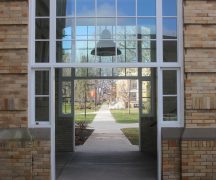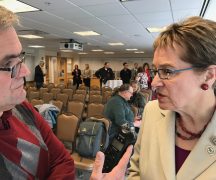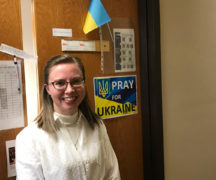By DAVID DUPONT
BG Independent News
Russia’s attack on Ukraine struck close to home for Tim Parsons, or at least his childhood home.
The first air strike against the Ukrainian capital, Kyiv, hit the apartment complex where he spent the early part of his life. “One of the first places that got bombed was the neighborhood I grew up in,” said Parsons, who is doing graduate studies in musical composition at BGSU. “I made all my first friends, first walked and talked in Ukraine. I played on the playground. Lots of cherished memories.”
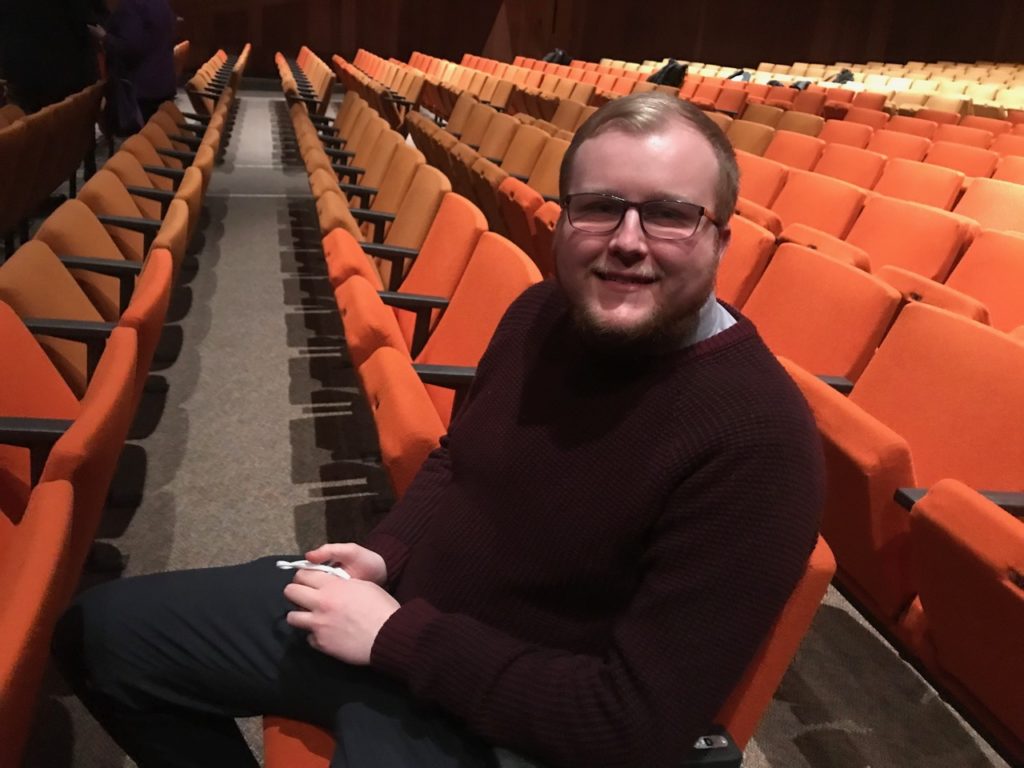
Now he sees images of children sent away without their parents. And photos of dead bodies. “Just terrible, terrible things. My heart’s breaking. It’s really hard to see.”
Parsons, 25, is the son of an evangelical missionary, who was the pastor of a church in the country, from the time his son was 9-months to 8 years old.
Most of those he still knows in Ukraine are through association of his father and his work.
He is in touch with his first piano teacher. As soon as the Russians invaded, he texted her.
She was on her way to Poland, she responded, and later he learned through his mother, she had arrived.
Ukraine is also where he first developed his love of music. He remembers “hearing music sung in the church every week, seeing the smiling faces of friends and loved ones.”
The songs were a mix of Ukrainian and American hymns, mostly chosen by his father, the pastor. “In general, hearing people sing with one voice, as one voice altogether, seeing that image as a child really impacted me.”
Those melodies, he said, still find their way into his music. And he has channeled his concerns about Ukraine into song.
[RELATED: Toledo Symphony brings to life BGSU students’ orchestral visions]
While his focus at BGSU has been on orchestral music, in the last couple years, he’s been writing more songs. “That’s become a coping mechanism, writing songs about how I’m feeling,” he said. “I wrote a prayer asking for peace and to see God’s love amid this crisis.”
As of early this week, he has not shared or recorded it, though he may create a video of it eventually.
“At the time it was a personal coping mechanism, not something I was going to share with people,” said Parsons, who works as a church music director. The music serves as a way “to process and give my feelings and emotions up to God.”
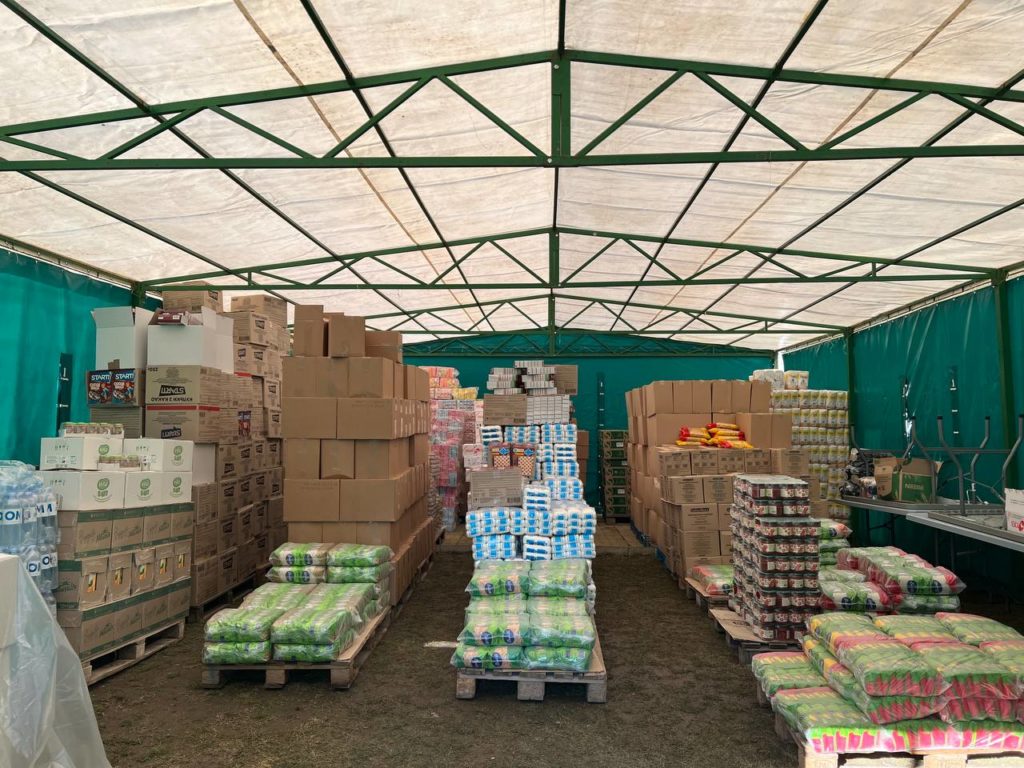
His father, Don Parsons, worries about how an expanding war in Ukraine could affect his son and others. Still, that should not deter the Biden Administration from taking stricter actions, including a possible no fly zone.
NATO should post as many as 100,000 troops on neighboring NATO countries’ Ukrainian borders “so Putin knows we’re serious and he’s under as much threat as he’s putting on Ukraine. We can play that game. The way we’re playing now is giving him a lot leeway. …What he’s doing is just pure evil. He wants power. He wants property expansion. If we continue to allow things to go this way, then what is Putin going to do next?”
When his son was young, Don Parsons was working for a Western evangelical group. Now he’s director for unreached people for Mission Eurasia, which is “almost entirely Ukrainian with some Russians and Moldovans.”
As we spoke late last week, he was preparing to travel to Poland to provide relief services to refugees. If called upon, he said, that could include venturing into Ukraine. “We’re really doing everything we can to get it into areas where people are really struggling and don’t have other resources.” They will avoid war zones though.
The mission’s goal is to train pastors to share the Gospel.
Now families have started to evacuate. The wives and children are headed west. The men have stayed behind to help establish aid networks. Mission Eurasia has been able to mobilize 400 churches and more than 1,000 volunteers in their effort.
Don Parsons will be bringing food, medicine, diapers, hygiene products and more. The relief effort will also secure flour to supply bakeries the mission helped to establish over the years.
“We’re trying to care for people as much as we can,” Don Parsons said. But in a country of 44 million, “the need is just massive.”
He spoke of the experience of one ministry partner. She helps with outreach to Roma people in Ukraine, and Parsons has spent time with her team visiting Roma villages.
She contacted him at the beginning of the war. She was in a dangerous position in a suburb of Kyiv, which the Russians were bombing as they moved toward the capital.
Her church was serving as a bomb shelter with as many as 170 people in the basement.
She sent photos of bombed out vehicles and buildings.
Some people were seeking shelter because Russian soldiers had taken over their homes.
The shelter had long since run out of gas, so all they had was a makeshift wood stove to cook soup in a bucket.
“Even the midst of all this her faith kept her and that whole group going,” Don Parsons said.
“She was sending songs of praise and worship, sharing the things God is doing, things to provide for them even in this horrible situation.”
At one point a dozen Russian soldiers came to the church. They scared the children and demanded documents.
Yet “they weren’t as threatening as you might think,” Parsons said. “One of the Russians actually said ‘we don’t want to be here.’ They just turned around and left.”
Eventually a corridor opened and they were able to get 170 people out of that village, he said.
The trip of about 20 miles to Kyiv was very difficult. Though they didn’t encounter any fighting, there was a lot of traffic impeded by vehicles destroyed by air strikes.
They passed a bus that had in huge letters “CHILDREN” painted on it. It was riddled with holes from shells.
“How do you deal with that?”
The theater that was blown up in Kyiv also had a message written large enough to read from the sky that there were children inside. “And they still bombed it,” he said. “Those things are so hard.”
When there is someone like this woman who is struggling yet still praising God, there’s no choice to provide assistance, he said.



